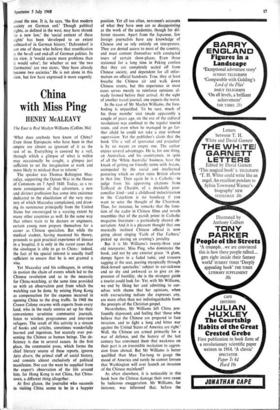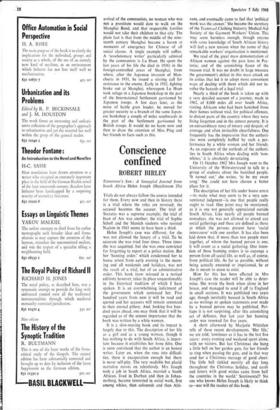The East is Red Maslyn Williams (Collins 36s)
China with Miss Ping
HENRY McALEAVY
'What does anybody here know of China? Even those Europeans who have been in that empire are almost as ignorant of it as the rest of us. Everything is covered by a veil, through which a glimpse of what is within may occasionally be caught, a glimpse just sufficient to set the imagination at work and more likely to mislead than to inform.'
The speaker was Thomas Babington Mac- aulay, supporting the Opium War in the House of Commons on 7 April 1840. Today, as a re- mote consequence of that adventure, a new and distinct profession has come into existence dedicated to the elucidation of the very mys- tery of which Macaulay complained, and draw- ing its sustenance principally from the United States but encouraged to a varying extent by many other countries as well. In the same way that others train to be doctors or engineers, certain young men prepare themselves for a career as Chinese specialists. But while the medical student, having mastered his theory, proceeds to gain practical experience of disease in a hospital, it is only in the rarest cases that the sinologue is able to go to China: indeed, the fact of his special interest is usually itself sufficient to ensure that he is not granted a visa.
Yet Macaulay and his colleagues, in setting in motion the chain of events which led to the Chinese revolution and so to the necessity for China-watching, at the same time provided us with an observation post from which the watching can be done, by seizing Hong Kong as compensation for the expense incurred in opening China to the drug traffic. In 1968 the Crown Colony swarms with experts from every land, who in the study centres set up for their convenience scrutinise communist journals, listen to wireless programmes and interview refugees. The result of this activity is a stream of books and articles, sometimes wonderfully learned and ingenious, but scarcely ever pre- senting the Chinese as human beings. The de- ficiency is due to several causes. In the first place, the communist press, which forms the chief literary source of these reports, ignores faits divers, the primal stuff of social history, and consists almost exclusively of political manifestos. Nor can the want be supplied from the expert's observation of the life around him, for Hong Kong is not China, but China-
town, a different thing altogether. . At first glance, the journalist who succeeds in visiting China seems to be in a happier position. Yet all too often, newsmen's accounts of what they have seen are as disappointing as the work of the academics, though for dif- ferent reasons. Apart from the Japanese, few foreign journalists have any knowledge of Chinese and so rely entirely on interpreters. They are denied access to most of the country, and must content themselves with conducted tours of certain show-places. Even those stationed for a long time in Peking confess that they are completely sealed off from Chinese society, and dependent for all infor- mation on official handouts. True, they at least breathe the Chinese air and walk down Chinese streets, but this experience in most cases serves merely to reinforce opinions al- ready formed before their arrival. At the sight of another travel journal, one expects the worst.
In the case of Mr Maslyn Williams, the fore- boding is unjustified. To be sure, much of his three months' visit (made apparently a couple of years ago, on the eve of the cultural revolution) was confined to the regular tourist route, and even when he managed to go far- ther afield he could not take a step without supervision. Yet the publisher's claim that the book 'lifts a veil of ignorance and prejudice' is by no means an empty one. The author enjoys several advantages. He is, for one thing, an Australian, and his countrymen, in spite of all the 'White Australia' business, have the knack of getting on friendly terms with Asians, unimpeded by the social and intellectual posturing which so often ruins British efforts in that line. Then again he is a Catholic—to judge from his approving citations from Teilhard de Chardin, of a decidedly post- conciliar kind—and a childhood indoctrination in the Catechism is no handicap if you want to seize the thought of the Chairman. Thus, for instance, he remarks that the func- tion of the cadre in Chinese films and novels resembles that of the parish priest in Catholic magazine literature—a particularly shrewd ob- servation. And it is a pleasant thought that one musically inclined Chinese official is now going about singing 'Faith of Our Fathers,' picked up during an evening's joviality.
But it is Mr Williams's twenty-three year old interpreter, Miss Ping, who dominates the book, and not by any exterior grace. 'A glum, dumpy figure in a faded tunic, and trousers sagging at the seat, peering myopically through thick-lensed spectacles,' subject to car-sickness and so shy and awkward as to give an im- pression of hostility, she is the strangest guide a tourist could look for. Yet, with Mr Williams, we end by liking her and admitting to our- selves with shame that her opinions, when with excruciating tedium she expresses any, are more often than not indistinguishable from the precepts of the Christian gospel.
Nevertheless, Mr Williams left China pro- foundly depressed, and feeling that 'those who believe that the Chinese are prepared to face invasion, and to fight a long and bitter war against the United States of America are right.' Well, the Chinese are armed primarily for a war of defence, and the history of the last century has convinced them that weakness on their part is an irresistible invitation to aggres- sion from abroad. But Mr Williams is better qualified than Mao Tse-tung to gauge the mood of America and surely he cannot foresee that Washington will ever launch an invasion of the Chinese mainland?
As often elsewhere, it is noticeable in this book how the Chinese damage their own cause by ludicrous exaggeration. Mr Williams, for instance, was informed that, before the arrival of the communists, no woman who was not a prostitute would dare to walk on the Shanghai Bund, and that respectable families would not take their children to that city. The plain fact is that from the middle of the nine- teenth century Shanghai became a haven at moments of emergency for Chinese of all social classes. A single example will suffice. A 'revolutionary writer' particularly admired by the communists is Lu Hsun. He spent the last years of his life (he died in 1936) in the foreign-controlled areas of Shanghai, from where, after the Japanese invasion of Man- churia in 1931, he issued a stirring call for resistance to the enemy. Early in 1932, fighting broke out at Shanghai, whereupon Lu Hsun took refuge in a Japanese bookshop in the part of the International Settlement garrisoned by Japanese troops. A few days later, as the noise of battle grew louder, he moved for greater security to a branch of the same Japan- ese bookshop a couple of miles southwards in the part of the Settlement garrisoned by British troops. It would do no harm now and then to draw the attention of Miss Ping and her friends to facts such as this.











































 Previous page
Previous page